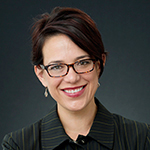By Amy Butler
 It’s the first anniversary of my work as pastor at my church. To mark the occasion, I think it’s only appropriate to write a bit about — change.
It’s the first anniversary of my work as pastor at my church. To mark the occasion, I think it’s only appropriate to write a bit about — change.
I think it would be a fairly objective statement to say we’ve been going through a little bit of change at my church this year. Come to think of it, “a little bit” might be somewhat of an understatement. The entire year has been a whirlwind of building relationships, learning to know and trust each other, and riding the waves of transition that come with a shift in leadership.
Change has been obviously visible here. Liturgy has shifted, the sermons are different, policies have been revised, there are a lot of new faces in leadership, there are a lot of new faces in the congregation. It’s easy to look around these halls and identify the many tangible ways in which considerable change has happened in this short time.
Thank goodness that this breadth of change is not always the norm, but living through a year of considerable change is an opportunity to acknowledge: even when change is not so tangibly present, it is always a constant of life. Never comfortable but always necessary, change is a constant in healthy lives, relationships and communities.
It’s not, in other words, a question of whether change will come. It’s rather a question of how we will handle it when it gets here.
I realized this yesterday, after a brief conversation with a church member. Along with internal organizational change, this year has welcomed some visible changes at our church. Several months ago, the building committee began plans to remove and restore the beautiful apse windows at the front of the nave, restoration work that is necessary for the care and upkeep of this historical sanctuary.
We tried to get everybody ready for the changes, but even having seen the pictures of planned scaffolding, the first time I walked into the nave and saw it in person my heart sank. I could only imagine the feelings of parishioners upon seeing the scaffolding grow each week. In combination with all the changes across the system in our church this year, the scaffolding felt jarring, almost like a slap in the face.
After worship yesterday a congregation member stopped me and said, “You know, Pastor Amy, I have been so unsettled by this scaffolding. I don’t like it, and it feels different and intrusive. So I’ve been struggling these past weeks, sitting here looking at it. But, you know, today I noticed that little staircase at the top of the scaffolding. It’s a small, precarious-looking staircase. But today in worship the thought occurred to me: that staircase is providing access to parts of this church that haven’t been visited in decades. Because of the scaffolding and that stairway, we might see different parts of our church from different perspectives, and I think that’s a gift.”
His comments gave me pause. I’d been wondering how to communicate that all will be well, that the change won’t unmoor us from the things that are most important. But when I heard this perspective — one I’d never thought of myself — I realized that the constant of change is only affected by our ability to see it as opportunity rather than disaster.
Sure, discomfort comes when things shift. And no matter how hard we try, we cannot keep change from happening. What we can do, I remembered yesterday, is choose the manner in which we will meet the change. We can choose to allow the discomfort to overtake our experience. Or we can, as I was reminded by my wise church member, choose to see the possibilities that come with this constant part of life.
Change is hard, there’s no doubt about it. But weathering the change together makes a community stronger. Learning to see the change we live as possibility might shift the way we look at our lives, and it might even take us to places we never imagined possible.
After that conversation yesterday, with my perspective altered just a bit, I felt thankful that I’m a preacher, someone who lives immersed in a world of metaphors. Because I can tell you right now, I loved the visual image of embracing change as a possibility for seeing life differently. But there is no way I am climbing those stairs!
